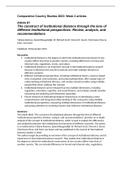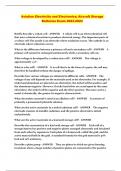Samenvatting
Summary Comparative Country Studies 2023: Week 2 articles (Exam Prep)
- Instelling
- Rijksuniversiteit Groningen (RuG)
In this document you can find a comprehensive summary of the 4 articles reviewed in week two of the course: Comparative Country Studies. It includes the following for each article: 5 key points, summary and overall conclusion. In the end, an overall conclusion of the 4 articles is included. This co...
[Meer zien]







